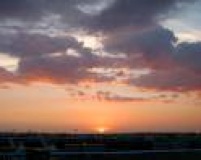
LA QUIETE DOPO LA TEMPESTA

LA QUIET DOPO LA TEMPESTA
(The Calm After the Storm)
(Giacomo Leopardi)
Christin Owens
Soprano
Stephen Taylor
Piano



La Quiete Dopo la Tempesta
La Quiete Dopo la Tempesta (The Calm After the Storm) is a setting
of a poem by the 19th Century Italian poet, Giacomo Leopardi. Each
of the three stanzas of the poem is set as a separate song. Leopardi
was a pessimistic thinker. This poem expresses his belief that joy is
the absence of pain, and the ultimate joy, therefore, is death. The
tesxt of the first song, Passata e la Tempesta (Gone is the Storm),
is light and gleeful as a storm has passed and the town’s people return
to work and play. The second song, Si Rallegra Ogni Core (Every
Heart is Happy), expresses Leopardi’s belief that joy is born of pain,
and our natural disposition is one of fear and suffering. In the third song,
O Natura Cortese (O Gracious Nature), we learn that happiness only
comes from a momentary lack of fear or suffering. The calm after the
storm is temporary and deludes us since it is preferable to the storm itself.
The only real relief from the strife of life comes from death.
The composition of this song cycle began as an exercise in setting an
Italian text as a preparation for writing an Italian opera. The rhythms
and imagery of Leopardi’s language inspired a somewhat traditional
Italian melodic and harmonic approach in these songs.
Every heart is happy.
When is life as sweet, as welcome
As it is now?
When with so much love
Does a man bend to his studies?
Or tend to his work?
Start something new?
When is he less aware of his troubles?
Joy is born of pain;
Vain joy, it is the fruit
Of past fear, and makes even one
Who loathed his life,
Tremble and fear death
Thus in long-drawn torment,
Cold, quiet, pale,
The people sweat and tremble, seeing
Moving in to threaten them
Lightening, clouds, and wind.
THE CALM AFTER THE STORM
by Giacomo Leopardi
Gone is the storm:
I can hear the birds again, and the hen
Returning to the road,
Repeating her song. Look how the blue sky
Breaks through in the west, over the mountain;
Clearing the countryside,
In the valley the river reappears.
Every heart is happy, everywhere
One hears the sound of the people
Returning to work.
The craftsman gazes at the humid sky,
With his work in hand, singing,
On his doorstep; out runs
A woman to fill her bucket
With fresh rain water;
The huckster renews
From street to street
His daily cry.
Look the sun is out, look it’s smiling
On the hills and homes. Balconies are being opened,
Terraces and porches are being opened by families:
And from the highway, you can hear in the distance
The sound of harness bells: as the squeaky traveler’s carriage
Resumes its journey.
O gracious nature,
These are your gifts,
These are the delights
You give to mortals. To be free from pain
Is our pleasure.
You scatter sorrow with a free hand, grief
Spontaneously appears, and the happiness, that so often
Through a freak of nature and some miracle
Grows out of trouble, is a great reward. Humanity
Dear to the gods! Happy to find
Some breathing room
From sorrow: is blessed
When all sorrows are finally relieved by death.
Translation by John B. Valerio
I. Passata e la tempesta
II. Si rallegra ogni core
III. O natura cortese
